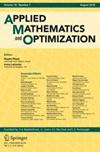一类Bang-Bang最优控制问题的后验误差估计
IF 1.7
2区 数学
Q2 MATHEMATICS, APPLIED
引用次数: 0
摘要
我们提出并分析了一类具有bang-bang解的控制约束最优控制问题的后验误差估计。我们考虑了一种基于变分方法的解决策略,其中控制变量不离散;没有进行吉洪诺夫正则化。对于所提出的方案,我们设计了一个残差型后验误差估计器,它可以分解为与状态方程和伴随方程离散化相关的两个单独贡献的总和。我们探讨了上述误差估计器的可靠性和效率特性。我们用数值例子来说明这一理论。本文章由计算机程序翻译,如有差异,请以英文原文为准。

A Posteriori Error Estimates for a Bang–Bang Optimal Control Problem
We propose and analyze a posteriori error estimates for a control-constrained optimal control problem with bang–bang solutions. We consider a solution strategy based on the variational approach, where the control variable is not discretized; no Tikhonov regularization is made. We design, for the proposed scheme, a residual-type a posteriori error estimator that can be decomposed as the sum of two individual contributions related to the discretization of the state and adjoint equations. We explore reliability and efficiency properties of the aforementioned error estimator. We illustrate the theory with numerical examples.
求助全文
通过发布文献求助,成功后即可免费获取论文全文。
去求助
来源期刊
CiteScore
3.30
自引率
5.60%
发文量
103
审稿时长
>12 weeks
期刊介绍:
The Applied Mathematics and Optimization Journal covers a broad range of mathematical methods in particular those that bridge with optimization and have some connection with applications. Core topics include calculus of variations, partial differential equations, stochastic control, optimization of deterministic or stochastic systems in discrete or continuous time, homogenization, control theory, mean field games, dynamic games and optimal transport. Algorithmic, data analytic, machine learning and numerical methods which support the modeling and analysis of optimization problems are encouraged. Of great interest are papers which show some novel idea in either the theory or model which include some connection with potential applications in science and engineering.

 求助内容:
求助内容: 应助结果提醒方式:
应助结果提醒方式:


